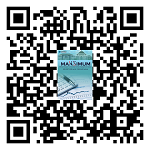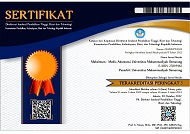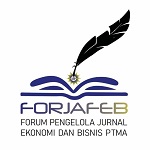Factors Affecting Financial Statement Fraud in Banking Sector: A Agency Perspective
(1) Universitas Muhammadiyah Semarang
(2) Universitas Muhammadiyah Semarang
(*) Corresponding Author
Abstract
This study aims to re-examine the factors that affect financial statement fraud. The population of this study is banking companies listed on the Indonesia Stock Exchange. The sampling technique in this study uses purposive sampling with an analysis unit of 145 financial statements with 29 companies as observations. The results showed that financial targets positively affect financial statement fraud because the higher the financial target, the higher the management acts on financial statement fraud. Financial stability does not affect financial statement fraud because bad financial conditions do not cause management pressure to commit financial statement fraud, which will cause various adverse conditions in the future. External pressure does not affect financial statement fraud because the company can use its debts well to utilize its assets and pay its obligations through the agreement. Independent commissioners do not involve financial statement fraud because they are hired only as a condition of the company so that its governance looks good.
Keywords
Full Text:
PDFReferences
ACFE. (2019). Survey Fraud in Indonesia. ACFE Indonesia Chapter. https://acfe-indonesia.or.id/survei-fraud-indonesia/
Achmad, T., Ghozali, I., & Pamungkas, I. D. (2022). Hexagon Fraud : Detection of Fraudulent Financial Reporting in. Economies Article, 10(13), 1–16.
Agustin, R., Nurcahyono, N., Sinarasri, A., & Sukesti, F. (2023). Financial Ratio and Stock Returns in Indonesia Equity Markets : A Signaling Theory Approach. International Conference on Business, Accounting, Banking, and Economics, 277–292. https://doi.org/10.2991/978-94-6463-154-8
Ainul, W., Wan, A., Razali, M., & Arshad, R. (2014). Disclosure of corporate governance structure and the likelihood of fraudulent financial reporting. Procedia - Social and Behavioral Sciences, 145, 243–253. https://doi.org/10.1016/j.sbspro.2014.06.032
Amri, A., Sudrajat, J., & Riantono, I. E. (2020). The Effect of Financial Target and Financial Stability on Fraudulent Financial Statements. Journal of Critical Reviews, 7(6), 692–699.
Andrew, A., Candy, C., & Robin, R. (2022). Detecting Fraudulent Of Financial Statements Using Fraud Score Model And Financial Distress. International Journal of Economics, Business and Accounting Research (IJEBAR), 6(1).
Aprilia, S. R. N. A., & Furqani, A. (2021). Deteksi Kecurangan Laporan Keuangan dengan Metode Fraud Diamond Pada Perusahaan Jasa. Journal of Accounting and Financial Issue (JAFIS), 2(2), 1–11. https://doi.org/10.24929/jafis.v2i2.1661
Arief, S., Nurkhin, A., & Pramusinto, H. (2018). An Analyis of Student ’ s Academic Fraud Behavior. Advances in Social Science, Education and Humanities Research, 164(Icli 2017), 34–38.
Aviantara, R. (2021). The Association Between Fraud Hexagon and Government’s Fraudulent Financial Report. Asia Pacific Fraud Journal, 6(1), 26–42. https://doi.org/10.21532/apfjournal.v6i1.192
Chantia, D., Guritno, Y., Sari, R., Pembangunan, U., & Veteran, N. (2021). Detection Of Fraudulent Financial Statements : Fraud Hexagon S.C.C.O.R.E Model Approach. Business Management, Economic, and Accounting National Seminar, 2(3), 594–613.
Chomariza, N. A., & Suhendi, C. (2020). Analisis Fraud Triangle terhadap Financial Statement Fraud Di Perusahaan Manufaktur Yang Terdaftar Di BEI Tahun 2016 – 2018. Prosiding Konferensi Ilmiah Mahasiswa Unissula (KIMU) 3, 217–241.
Dewi, K., & Anisykurlillah, I. (2021). Analysis of the Effect of Fraud Pentagon Factors on Fraudulent Financial Statement with Audit Committee as Moderating Variable. Accounting Analysis Journal, 10(1), 39–46. https://doi.org/10.15294/aaj.v10i1.44520
Dewi, S. (2019). Pengaruh Kinerja Lingkungan Terhadap Kinerja Keuangan Dengan Corporate Sosial Responsibility Sebagai Variabel Intervening. Daya Saing Jurnal Ekonomi Manajemen Sumber Daya, 21(2), 144–150.
Duffin, & Djonan, D. (2022). The Analysis Of Fraud Hexagon Towards Earnings Management. Jurnal Impresi Indonesia, 1(4), 328–340. https://doi.org/10.36418/jii.v1i4.54
El-Helaly, M., & Al-Dah, B. (2022). Related party transactions and dividend payouts. Finance Research Letters, 49(January), 103114. https://doi.org/10.1016/j.frl.2022.103114
Eriyanti, E., Yani, N. D., Rahmalia, N. R., & Kabib, N. (2022). Deteksi Pengaruh Financial Stability , External Pressure , dan Financial Targets terhadap Financial Statement Fraud di Masa Pandemi Covid-19 (Studi Empiris pada Perusahaan Manufaktur Yang Terdaftar di JII 70). Jurnal Akuntandi Dan Audit Syariah, 3(2), 113–129.
Ermawati, D., Nurcahyono, N., Sari, D. N., & Fakhruddin, I. (2023). The Dynamic Impact of Intellectual Capital on Firm Value : Evidence from Indonesia. International Conference on Business, Accounting, Banking, and Economics, 1, 246–262. https://doi.org/10.2991/978-94-6463-154-8
Handayani, J. R., Nurcahyono, N., Saadah, N., & Winarsih. (2023). Hexagon Fraud : Detection of Fraudulent Financial Statement in Indonesia. International Conference on Business, Accounting, Banking, and Economics, 1, 263–276. https://doi.org/10.2991/978-94-6463-154-8
Harris, D. G., Shi, L., & Xie, H. (2018). Advances in Accounting Does benchmark-beating detect earnings management ? Evidence from accounting irregularities ☆. Advances in Accounting, 41(April), 25–45. https://doi.org/10.1016/j.adiac.2018.04.001
Hidayat, W., Tjaraka, H., Fitrisia, D., Fayanni, Y., Utari, W., Indrawati, M., Susanto, H., Tjahjo, J. D. W., Mufarokhah, N., & Elan, U. (2020). The effect of earning per share, debt to equity ratio and return on assets on stock prices: Case Study Indonesian. Academy of Entrepreneurship Journal, 26(2), 1–10.
Ibrani, E. Y., Faisal, F., Handayani, Y. D., & Ntim, C. G. (2019). Determinant of non-GAAP earnings management practices and its impact on firm value Determinant of non-GAAP earnings management practices and its impact on firm value. Cogent Business & Management, 6(1). https://doi.org/10.1080/23311975.2019.1666642
Ikbal, M., Irwansyah, I., Paminto, A., Ulfah, Y., & Darma, D. C. (2020). Explores the Specific Context of Financial Statement Fraud Based on Empirical from Indonesia Related papers Explores the Specific Context of Financial Statement Fraud Based on Empirical from Indonesia. Universal Journal of Accounting and Finance, 8(2), 29–40. https://doi.org/10.13189/ujaf.2020.080201
Jamil, M. C., & Yudowati, S. P. (2019). Pengaruh Fraud Triangle terhadap Kecurangan Laporan Keuangan (Studi Kasus pada Perusahaan Pertambangan yang Terdaftar di Bursa Efek Indonesia pada Periode Tahun 2013-2017). E-Proceeding of Management, 6(2), 3167–3173.
Jansen, M. C., & Meckling, W. H. (1976). Theory of the Firm: Managerial. Agency Costs and Ownership Structure.
Jia, C., Ding, S., Li, Y., & Wu, Z. (2009). Fraud, enforcement action, and the role of corporate governance: Evidence from China. Journal of Business Ethics, 90(4), 561–576.
Joob, B., & Wiwanitkit, V. (2017). How Accused Scientists Deal with Scientific Fraud : View from a Different Culture. Science and Engineering Ethics, 6–7. https://doi.org/10.1007/s11948-017-9947-6
Muzdalifah, M. (2021). Pengaruh Good Corporate Governance Terhadap Fraud Pada Perusahaan Perbankan. Amnesty: Jurnal Riset Perpajakan, 3(1), 56–64. https://doi.org/10.26618/jrp.v3i1.3406
Neva, S., & Amyar, F. (2021). Pengaruh Fraud Diamond Dan Gonetheory Terhadap Academic Fraud. Jurnal Analisis Sistem Pendidikan Tinggi, 5(1), 29–38.
Nugroho, D. S., & Diyanty, V. (2022). Fraud Hexagon and Fraudulent Financial Statement : Comparison Between OMI and Beneish Model. Proceedings of the International Conference on Economics, Management and Accounting, 207(Icemac 2021), 1–10.
Nurcahyono, N., & Hanum, A. N. (2023). Determinants of Academic Fraud Behavior: The Perspective of the Pentagon Fraud Theory. Lawang Sewu International Conference, 163–177. https://doi.org/10.2991/978-2-38476-078-7_18
Nurcahyono, N., Hanum, A. N., Kristiana, I., & Pamungkas, I. D. (2021). Predicting fraudulent financial statement risk: The testing dechow f-score financial sector company inindonesia. Universal Journal of Accounting and Finance, 9(6), 1487–1494. https://doi.org/10.13189/ujaf.2021.090625
Nurcahyono, N., Sukesti, F., & Alwiyah, A. (2021). Covid 19 Outbreak and Financial Statement Quality: Evidence from Central Java. AKRUAL: Jurnal Akuntansi, 12(2), 193. https://doi.org/10.26740/jaj.v12n2.p193-203
Nurcahyono, N., Sukesti, F., & Haerudin, H. (2022). The Effect of Good Corporate Governance Mechanisms, Financial Ratio, and Financial Distress: A Study on Financial Companies. ICBAE. https://doi.org/10.4108/eai.10-8-2022.2320848
Nuryuliza, S., & Triyanto, D. N. (2019). Pengaruh Fraud Triangle terhadap Kecurangan Laporan Keuangan ( Studi Empiris Pada Perusahaan Sektor Pertambangan yang Terdaftar di Bursa Efek Indonesia Periode 2015-2017 ). E-Proceeding of Management, 6(2), 3157–3166.
Omukaga, K. O. (2019). Is the fraud diamond perspective valid in Kenya ? Emerald Insight. https://doi.org/10.1108/JFC-11-2019-0141
Permata, D., Utami, W., & Purnamasari, D. I. (2021). The impact of ethics and fraud pentagon theory on academic fraud behavior 1). Journal of Business and Information Systems, 3(1), 49–59. https://doi.org/10.36067/jbis.v3i1.88
Permatasari, M., Nurcahyono, N., Bilqis, L. K., & Nugroho, W. S. (2023). The Effect of Good Corporate Governance and Financial Ratios on Financial Distress. International Conference on Business, Accounting, Banking, and Economics, 1(1), 321–336. https://doi.org/10.2991/978-94-6463-154-8
Prajanto, A., & Pratiwi, D. R. (2016). The Impact of Corporate Culture and financial retios on the fraudulent Financial Statement. Jurnal Dinamika Akuntansi, 8(1), 39–52.
Putri, Z. A. P., & Nugroho, A. H. D. (2021). Pengaruh Fraud Triangle Terhadap Deteksi Kecurangan Pelaporan Keuangan pada Perbankan Konvensional yang Terdaftar di Bank Indonesia Tahun 2015-2019. Jurnal Indonesia Sosial Teknologi, 2(10), 1872–1891. https://doi.org/10.36418/jist.v2i10.250
Ratnasari, M., & Rofi, M. A. (2020). Faktor-Faktor Yang Memotivasi Kecurangan Laporan Keuangan. Journal of Management and Business Review, 17(1), 79–107. https://doi.org/10.34149/jmbr.v17i1.202
Saadah, L., Gita Wahyu Kristina, V., Hariadi, S., & Kadir Usry, A. (2022). Pengaruh Stabilitas Keuangan, Kondisi Industri, Dan Tekanan Eksternal terhadap Kecurangan Laporan Keuangan Dalam Fraud Triangle. Jurnal Analisa Akuntansi Dan Perpajakan, 6(2), 210–219. https://doi.org/10.25139/jaap.v6i2.5041
Sari, P. N., & Husadha, C. (2020). Pengungkapan Corporate Governance terhadap Indikasi Fraud Dalam Pelaporan Keuangan. Jurnal Ilmiah Akuntansi Dan Manajemen, 16(1), 46–56. https://doi.org/10.31599/jiam.v16i1.108
Sintabela, D., & Badjuri, A. (2023). Pendeteksian Kecurangan Laporan Keuangan Berbasis Fraud Triangle Melalui Kualitas Audit Sebagai Pemoderasi. Junal Bina Akuntansi, 10(1), 378–399.
Siregar, E., & Surianti, M. (2022). Pendeteksian Kecurangan Laporan Keuangan dalam Perspektif Fraud Triangle Pada Perusahaan Sektor Infrastruktur, Utilitas …. Jurnal Akuntansi, Keuangan Dan Perpajakan, 5(1), 27–39.
Susanto, E. V., Ulum, A. S., & Ardianingsih3, A. (2021). The Influence of Company Internal and External Factors on Audit Delay (Empirical Study on Manufacturing Companies in the Consumer Goods Industry Sector Listed on the Indonesia Stock Exchange 2016-2020). Budapest International Research and Critics Institute - Journal (BIRCI - Journal), 4(4), 11038–11047.
Susanto, H. (2020). Analisis Pengaruh Fraud Triangle Terhadap Kecurangan Laporan Keuangan pada Perusahaan Subsektor Pertambangan Batu Bara di Bursa Efek Indonesia. Jurnal FinAcc, 5(7), 1071–1082.
Tan, Angelina, N., & Anis, C. (2022). Pengaruh Proporsi Dewan Komisaris Independen, Aktivitas Komite Audit dan Kepemilikan Manajerial terhadap Kecurangan Laporan Keuangan. Diponegoro Journal of Accounting, 11, 1–13.
Thi, H., Ha, V., & Binh, D. T. (2017). Application of F-Score in Predicting Fraud , Errors : Experimental Research in Vietnam. 7(2). https://doi.org/10.5296/ijafr.v7i2.12174
Vidella, A., & Afiah, E. T. (2020). Financial Stability, Financial Targets, Effective Monitoring dan Rationalization dan Kecurangan Laporan Keuangan. Jurnal Revenue, 01(01), 90–100.
Wahyuni, D., Isynuwardhana, D., & Nazar, M. R. (2023). Pengaruh Financial Stability , External Pressure Dan Financial Target Terhadap Financial Statement Fraud ( Studi Empiris pada Perusahaan Non-Perbankan yang Terdaftar dalam Indeks SRI-KEHATI Periode 2017-2020 ). E-Proceeding of Management, 10(2), 1087–1094.
Wulandari, A. N., & Trisnawati, R. (2022). Analisis Faktor-Faktor yang Mempengaruhi Kecurangan Laporan Keuangan dengan Perspektif Fraud Hexagon (Studi Empiris Pada Perusahaan Manufaktur Yang Terdaftar Di Bursa Efek Indonesia Periode 2018-2020). Ekonomi Dan Bisnis, 11(3), 204–216.
Yao, J., Pan, Y., Yang, S., & Chen, Y. (2019). Detecting Fraudulent Financial Statements for the Sustainable Development of the Socio-Economy in China : A Multi-Analytic Approach. https://doi.org/10.3390/su11061579
Yunus, M., Sianipar, O. L., Saragih, K. Y., & Amelia. (2019). Deteksi Financial Statement Fraud Berdasarkan Perspektif Pressure dalam Fraud Triangle. Riset Dan Jurnal Akuntansi, 3(2), 350–360. https://doi.org/10.33395/owner.v3i2.229
Article Metrics
Abstract view : 594 timesPDF - 3 times
DOI: https://doi.org/10.26714/mki.14.1.2024.102-113
Refbacks
- There are currently no refbacks.
-----------------------------------------------------------------------------------------------------------------------------------------------------------------------------------
 | MAKSIMUM: Media Akuntansi Universitas Muhammadiyah Semarang |
![]()
Maksimum: Media Akuntansi Universitas Muhammadiyah Semarang is licensed under a Creative Commons Attribution Attribution-NonCommercial-NoDerivatives 4.0 International License.

















